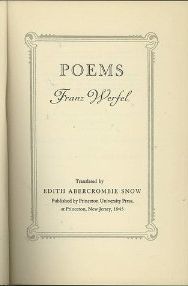near fine, poor chipped worn dj, olive cloth, clean text. 119 pgs In German & English, on facing pages. Trans. by Edith Abercrombie Snow. 1st edition. Binding is hard.
Franz WERFEL, born, 1890, Prague, the son of a wealthy Jewish glove manufacturer. Educated in Prague, where he met Franz Kafka and Max Brod. In 1909 worked for a time in a shipping firm. After studies in Leipzig and Hamburg, Werfel worked at a publishing company from 1911 to 1914. Edited the expressionist series Der Jüngste Tag with Walter Hasenclever and Kurt Pinthus. Werfel's first verse collection, Der Weltfreund, a celebration of human brotherhood, appeared in 1911, and is significant in the history of expressionism. On the eve of war, organized a pacifist society with Martin Buber, Gustav Landauer, and Max Scheler. From 1915 to 1917 Werfel served in the Austrian army on the Italian & Russian (Galicia) fronts. In 1916 his first play, a pacificistic adaptation of Euripides' Trojan Women, had a successful run in Berlin. After combat service on two fronts, Werfel was transferred to the war press bureau in Vienna, but his reading of pacifistic poems in the Vienneses cafés led to a charge of treason & he was arrested. Werfel's second book of poems, containing his pessimistic war poetry, Der Gerichttag (The Day of Judgment), appeared in 1919. While in Vienna, Werfel met composer Alma Mahler-Gropius, the widow of Gustav Mahler and wife of architect Walter Gropius. She was friends with many notable composers, artists & writers, and was painted repeatedly by Kokoschka & Klimpt. She divorced Gropius and took up with Werfel; they were married in 1929. In 1924 Werfel published Verdi, Roman der Oper (Verdi, A Novel of the Opera). Die vierzig Tage des Musa Dagh (1933; The Forty Days of Musa Dagh), an epic novel about Armenian resistance to the Turks, brought him international fame. Keeping ahead of a spreading Nazism, Werfel, a Jew, settled in an old mill in southern France. With the fall of France in 1940 (reflected in his play Jakobowsky und der Oberst, written in 1944 and successfully produced in New York City that year as Jakobowsky and the Colonel), he decided to flee to the United States. In the course of his journey, he found solace in the pilgrimage town of Lourdes, France, where St. Bernadette had had visions of the Virgin. He vowed to write about the saint if he ever reached America and kept the vow with Das Lied von Bernadette (1941; The Song of Bernadette, 1942). His novel was the basis for a popular film (1943) that won four Academy Awards.
